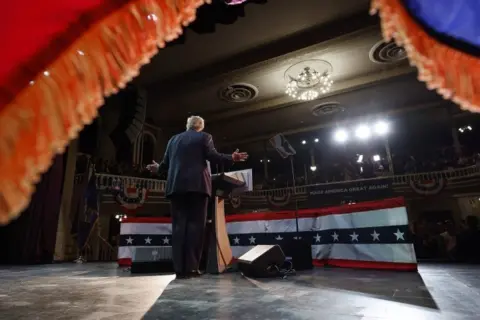Nikki Haley finally gets her solo showdown with Donald Trump in New Hampshire
With Ron DeSantis suspending his presidential campaign on Sunday, Nikki Haley gets the one-on-one match-up with Donald Trump for which she's been longing.
"At one point in this campaign, there were 14 of us running," she says in an email fundraising pitch, sent out shortly after the DeSantis news broke.
"But today, it's officially a two-person race between me and Donald Trump!"
Ms Haley's showdown with Mr Trump in the state-by-state contest to choose a Republican presidential candidate may not turn out exactly as she hoped, however. The way the 14-person field has thinned of late has played out mostly to the former president's advantage.
First, Mr DeSantis edged ahead of Ms Haley for second place in Iowa's caucuses, denying her any substantial momentum boost heading into New Hampshire, which votes on Tuesday.
The day after Mr Trump's huge win in Iowa, another presidential rival, Vivek Ramaswamy, withdrew from the race and endorsed Mr Trump, giving him an extra round of headlines.
Now Mr DeSantis is out of the picture, as well. Like Mr Ramaswamy, he has endorsed Mr Trump, although with a bit less fervour. The Florida governor reserved most of his passion for Ms Haley - and not in a good way.
He called the former US ambassador to the UN part of "the old Republican guard of yesteryear - a repackaged form of warmed-over corporatism". It was a line of attack - Haley the elite-loving globalist - that has been the centrepiece of Mr Trump's attack on his former Cabinet member over the past few days.
It took six days for the DeSantis campaign to churn through the stages of political grief and arrive at acceptance. But his decision to back out when he did, and the way he did, might have helped sealed Mr Trump's victory.
Most public-opinion surveys indicate that a clear majority of voters who support Mr DeSantis view Mr Trump as the next best option, suggesting that his withdrawal will end up being a boon to the former president.
A CNN/University of New Hampshire poll released earlier on Sunday, for instance, found 62% of those in the state who backed Mr DeSantis named Mr Trump as their second choice, while only 30% named Ms Haley.
Those aren't great numbers for the former South Carolina governor who has been focusing on New Hampshire for months as the place she believes will give her campaign the boost necessary to seriously challenge Mr Trump.

More on the US election

In theory, her strategy was sound. The state's Republican primary is open to independent voters as well as members of the party, allowing moderates who may not like Mr Trump's brand of conservative populism to have a say. The state also has a higher number of college graduates in its population, 37%, which is one of Ms Haley's strongest demographics.
She's seen her support rise in the state over recent months, as she's become the clear alternative for those who don't favour the former president. There's little doubt she brings the people skills that DeSantis lacked and has also chosen a different path to the former Florida governor, who positioned himself to the right of Mr Trump.
In policy and tone, her campaign has been described as something of a throwback to a pre-Trump era in the Republican Party. There is more compromise in her message and she has largely stayed away from grievance politics and conspiracy theories. And she supports continuing US funding of the Ukraine war.
 Getty Images
Getty ImagesBut not being Trump and delivering a more moderate message may not be enough.
If she fails to beat him in New Hampshire, it is difficult to see where she might prevail - even in her South Carolina home, where the former president is immensely popular and has the support of almost every other state Republican official.
The lament among anti-Trump Republicans has always been that a majority in the party didn't want to see him as the nominee again, but the field against him was simply too divided. If they could only unite behind one candidate, the argument went, victory would be within reach.
In New Hampshire, on Tuesday, that theory will finally be put to the test.
